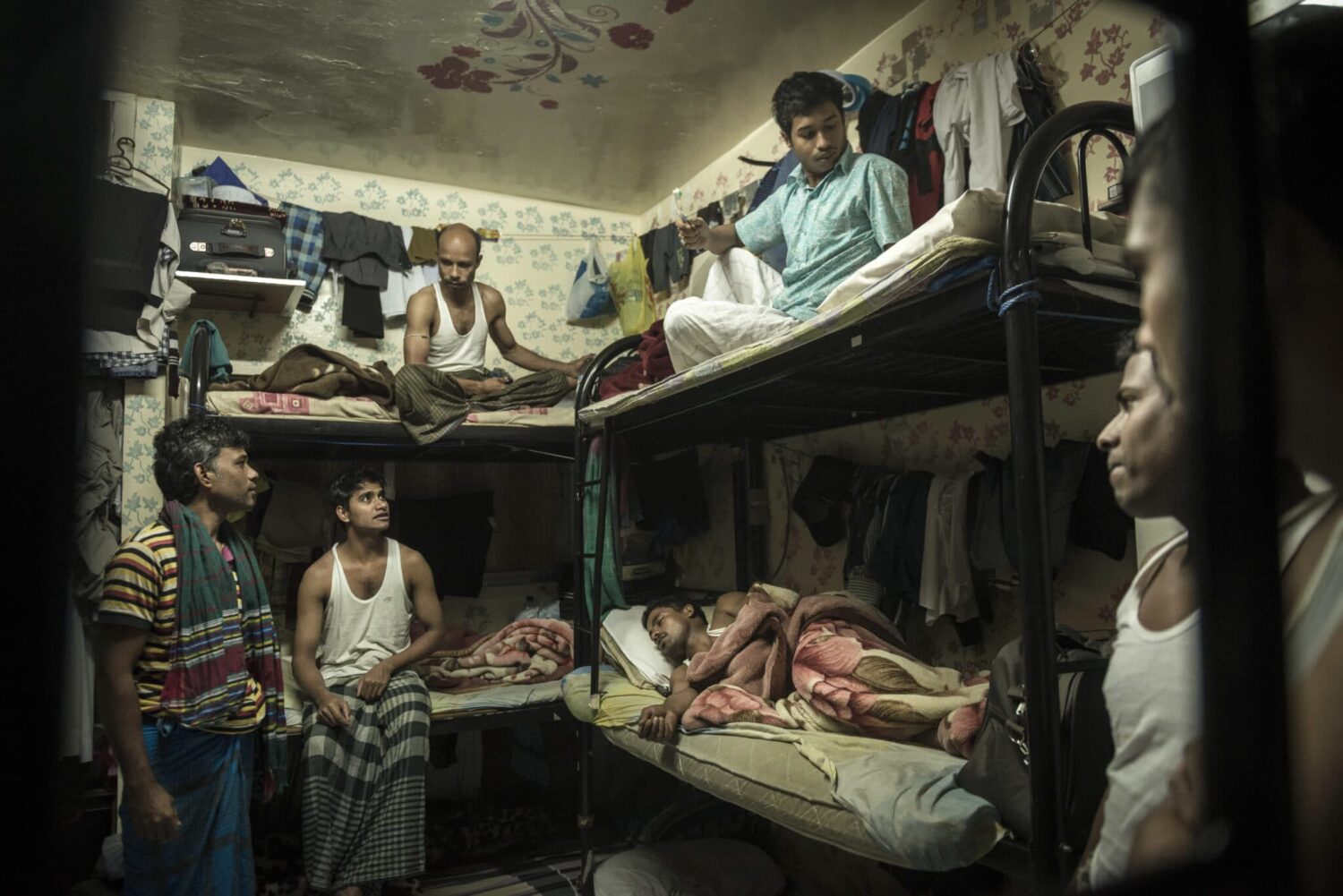
The human-rights picture is far from satisfactory for citizens and expatriates alike but is especially bad for migrant and foreign domestic workers, who constitute the largest demographic component of the UAE. In mid-2010 (the most recent period for which data are available), non-nationals accounted for 88.5 percent (8.26 million) of the UAE’s population.
The UAE (especially Dubai and Abu Dhabi) is bustling with major construction, including high-profile projects such as the Guggenheim Museum, the Louvre, and a campus of New York University, all located on Saadiyat Island in Abu Dhabi. Dubai is currently building the infrastructure for the World Expo in 2020. However, the image the UAE is trying to cultivate—a modern, stable country attracting more than 13 million international visitors in 2014—contrasts with the reality faced by those who build its showpieces.
Despite labour reforms in recent years, migrant workers continue to be subjected to abuse that amounts to forced labour, while complaints of inadequate housing, non-payment of wages, and deportation persist, according to Human Rights Watch in its 2015 report. Despite some improvements (compared to its earlier reports in 2009 and 2012), researchers found that some workers had their passports withheld, were not paid, or were paid extremely low wages, which makes it difficult for them to pay off recruitment fees that should have been abolished in the first place.
The practice of charging workers recruitment fees has been prohibited since 1980, but Human Rights Watch, among others, has found in recent years that workers have to pay exorbitant recruitment fees to recruitment agencies in their home country or in the UAE. The UAE has since strengthened its regulation of domestic recruitment agencies, but employers are still not required to verify that they, not their workers, have paid all recruitment fees. The law prohibits recruitment agents from charging workers any fees and empowers the Ministry of Labour to force agencies to refund to the worker any fees paid. However, based on testimonies from workers in Abu Dhabi, Human Rights Watch found that workers still pay recruitment fees of $1500 to $3000.
The International Labour Organization has identified the withholding of identity documents, including passports, as a key indicator of forced labour.
Trapped in the UAE
Non-payment of wages has long been one major complaints of the workers. Despite measures by the government to ensure correct (electronic) payment, some workers in Abu Dhabi have said that they had received no salary for periods of up to five months. The labour law guarantees skilled workers a minimum wage (5000 Emirati dirhams = $1300), but low-paid (often unskilled) construction workers are excluded. The labourers say they struggle to repay the loans they had taken on in their home countries and to feed their families.
Workers are trapped in the UAE by the so-called kafala (sponsorship) system, which binds the employee to a single employer (sponsor) and prohibits the employee from switching employers or leaving the country without the sponsor’s consent. In January 2011, the government amended the law regulating the kafala system, permitting employees to change employers without penalty, but, as of mid-2015, the kafala system itself is still in place. It is one of the major problems faced by labourers, because they are entirely dependent on the whim of their employer.
The labourers’ housing facilities could not contrast more starkly with the often luxurious premises they are building in the UAE. Migrant construction workers often live in labour camps on the outskirts of Abu Dhabi or Dubai, segregated from the rest of society. Housing is often substandard, with cramped rooms containing bunk beds and few other facilities. During a visit to workers’ accommodations in central Abu Dhabi, researchers found 27 men living in two rooms. The men, who said they worked as painters on the New York University (NYU) site, shared two toilets, had to wash their work clothes in the bathroom, and had to store work tools and materials, including paint, in their rooms.
Labourers have inadequate access to the justice system when they have complaints, and they are under heavy pressure from their employers to stay silent, threatened with non-payment of wages or cancellation of their visas. When they do complain or decide to organize a strike, they risk arrest, detention, or—worse—deportation. Two hundred workers of BK Gulf, which does construction work on Saadiyat Island, were deported after they went on strike in October 2013 to protest low wages. In March 2015, several hundred workers staged a strike in central Dubai to demand higher wages for their work on the Fountain Views development; reportedly, no arrests were made. The UAE labour law does not guarantee workers’ rights to organize or bargain collectively, so strikes are illegal.
Despite measures taken by the authorities and new standards set by the organizations involved (NYU, Louvre, Guggenheim), the complaints mentioned above indicate that the rules are not adequately enforced.
The United Nations has been investigating the abuse of migrant workers after a complaint by the International Trade Union Confederation (ITUC) that migrants are doing construction and domestic work under conditions of forced labour.
Domestic workers are excluded from the labour law and have even fewer protections than other migrants. There have been frequent reports of abuse by employers.


